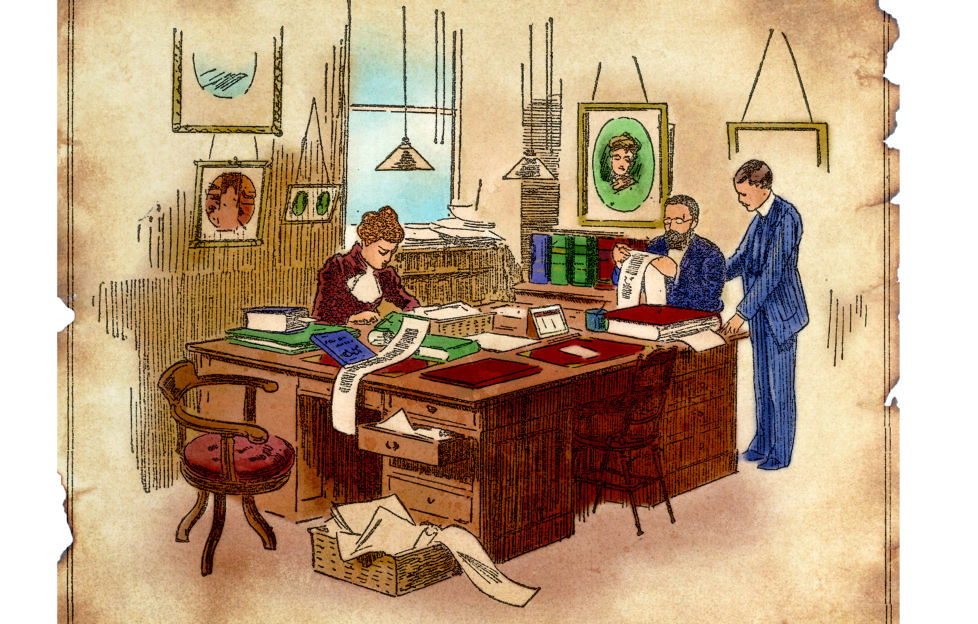Poetry In the “Friend”: Verse And Worse

The “Friend” has always had a tradition of publishing poetry from amateur as well as professional poets.
Throughout the years, would-be scribes sent verses to the Poetry Editor, hoping to hear those sweet words, “We would like to buy your poem for ‘The People’s Friend’”.
Many were successful. Reading the old volumes from Victorian times to the present day, the results of their labours appear on many pages.
There are all kinds of poems: happy, sad, funny, silly, poignant, thoughtful — all chosen for the connection they made with the readers.
Poets in the “Friend”
Professor Kirstie Blair of Strathclyde University knows more than most about the poetry of the “Friend” in its early days.
Those verses — along with poems in our sister paper, “The People’s Journal”, and those in local newspapers of the day — are the subject of her latest book.
And her “Working Verse in Victorian Scotland” recently won the prestigious Saltire Society Prize for Book of the Year and Research Book of the Year.
The ordinary people who wrote those poems — farm workers, servants, factory workers, miners, railway workers, and many more – speak to us down the years about their working lives, their families and their hopes and dreams. Not so very different from our poets today.
Interviewing Kirstie for this week’s issue, it was fascinating to hear about her admiration for those forgotten poets and their work.
As she told us, those poets had busy lives. They often completed a hard day’s physical labour before coming home to commit their thoughts to paper.
Back in those early days, they also had to be quite brave to send their work to us for publication.
Today, our poets receive a response through the post or in an email. But back then, the Editor made his thoughts on their efforts known through the pages of the “Friend”.
And those thoughts weren’t always very encouraging . . .
Wednesday, Aug 31, 1870
W.M.G. – “The Captive and his Captor” is not up to the mark. The lines are rough and rugged, and the rhyme is anything but perfect. Besides, the poet Campbell, we think, has set the same story in never-dying verse, making your piece appear worse by the comparison.
F.D.G. – “A Sonnet” is entirely unsuitable. Swallows flying “with a gentle glide” is enough, and “wild” and “glide” as rhymes are more than sufficient. “A Mother’s Care” is equal in merit with the former piece. In one verse you say, “A mother’s care is sure always,” and in the next you tell us that “A mother’s care oft ‘wavers.’” How do you reconcile the two statements? “The One I Love” is, if possible, a worse piece than the other two. Here is the first verse:
“IN a neat little cottage down near yon green bank,
Where the river flows clearly as if in a tank;
Where grows the green rashes, so lovely to see,
And the birds do fly past, as also the bee.”
J.J. – The war bard has yet to arise; you are not he. Excuse our saying it, the piece is doggerel, and no amount of polishing could make it acceptable. We could take in hand to write as good a piece ourselves.”
J.N.S. – “To the Sun” is neither better nor worse than a good many other “first attempts” that come to hand almost every week. We don’t say that you should never try again, nor do we wish to raise false hopes by telling you to persevere; but we will be glad to mark your progress when you can write better poetry than what you now send.
Wednesday, October 12, 1870
A.A. – Judging from the piece you sent, we should not be inclined to encourage you to persevere in writing verses. Your handwriting is plain, and easily read, but not pretty.
Wednesday, June 22, 1870
G.B.F. – We are glad to mark the improvement which your verses show, and have pleasure in rewarding your patience and perseverance by accepting “The Emblem”, which is up to the mark. The other piece, “Jilted,” as an exercise in rhyme, is very good, and sows that you have at least a tolerable command of language; but it is not much worth as a piece of poetry. The subjects you choose are at times rather odd, though we don’t find fault with that, but they as a rule demand a higher standard of excellence to render them interesting to the general reader.
Today, as in the beginning, a poem must be right for the “Friend” and its readers before it can appear on the page.
Thankfully, even if a poem is not suitable for us, our response to the writer is likely to be gentler than it was in 1870!
For more from the team, read our blog here.
To find out more about poetry in the “Friend”, click here.





